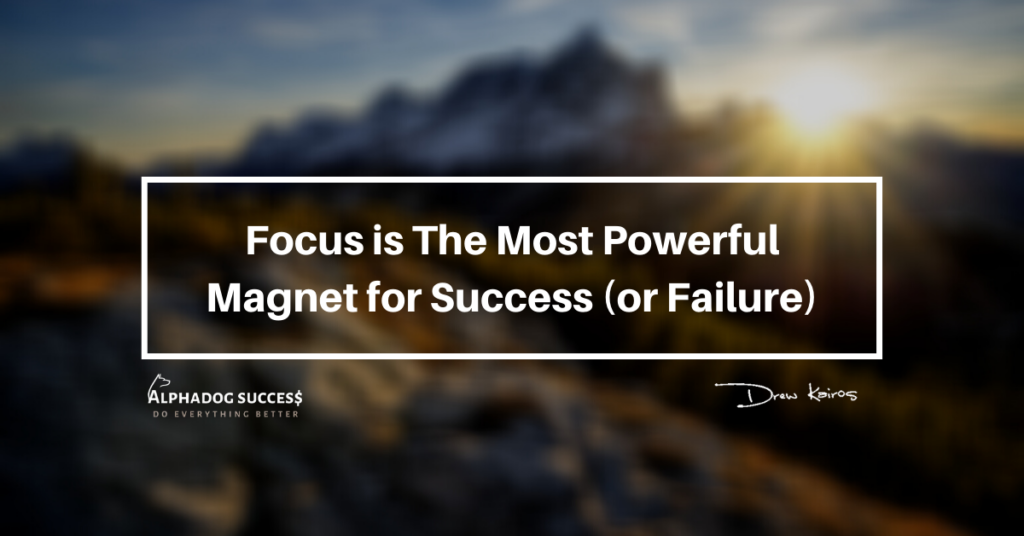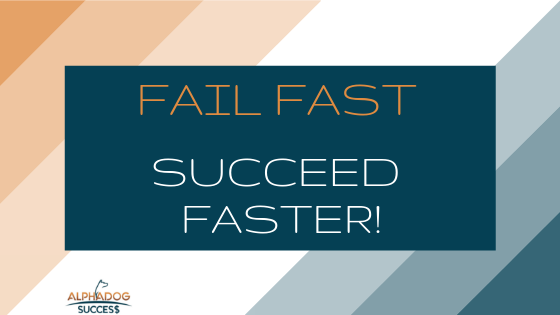Focus on The Most Powerful Magnet for Success (or Failure)
“You can’t depend on your eyes when your imagination is out of focus.” ~ Mark Twain Remember old fashioned cameras (or any that weren’t in your phone)? They had intricate lenses you had to focus by hand. The process was very precise and technical and your results were 100% determined by… …what you focused on. If you didn’t get the results you wanted, it was because the lens wasn’t focused properly. One little tic to the right or left and you would’ve had the perfect shot. Right? The good news about that is that you had the power to shift the focus (and the result) of the image. Today I’d like to explore something that you can do, just like shifting the focus point on a camera… …to shift the results of your life. We all want the “tack sharp” beautiful, abundant, fulfilling life of our daydreams, right? Here’s how you get it: Focus As many coaches and inspirational leaders so often say: “What you focus on determines your results.” And they are right. I’ve been using this principle in my life, very successfully, for decades. And I’ve seen it happen with other people, over and over again, with terrific results. In order to get what you want in life… …you must focus your mind toward what you want, and away from what you don’t want. Your brain is a very powerful magnet – and it operates like a search engine. It acts like a heat-seeking missile, drawing to you whatever it is you are focusing on. And the more energy, vibrancy, and passion you conjure up in your imagination… …the harder your brain works to make those thoughts your reality. Whatever you focus on most – the failure or the success, the love or the betrayal, the win or the loss – the more situations, people and resources you will attract to make the object of your focus a reality. The Science of Focus This isn’t just woo-woo, pie-in-the-sky thinking. There are scientific reasons and countless studies that prove this out. Your brain has a mechanism called the Reticular Activating System (RAS). The (RAS) is a bundle of nerves at your brainstem that filters out unnecessary information so the important stuff gets through. The RAS is the reason you learn a new word and then start hearing it everywhere. This is why you can tune out a crowd full of talking people, yet immediately snap to attention when someone says your name or something that at least sounds like it. It’s the reason you see BMWs everywhere, the moment you decide to buy a BMW. It’s why red flags go up when you sense something isn’t on the up-and-up. Or why you trip on the same pothole every time. It’s also the reason – if you focus too often on how hard something is – your brain automatically leaps to the obstacles and not the solutions. In effect…it attracts the obstacles, rather than the solutions. Training Your Brain As you can see, it’s very important that your mind leans toward what you want, toward resourceful thoughts and feelings that serve you, and away from those that quietly sabotage you. Bear in mind, “positive thinking” isn’t automatic or easy. It doesn’t come to us naturally. And there’s a scientific reason for that… In case you’re feeling bad about yourself for being “negative” too often. Our brain, since caveman days, had to be alert to potential dangers in order to survive. We evolved as a species by being highly aware of our surroundings. We were ingrained, for our very survival, to focus on the potentially negative… …to spend time, energy, and resources on potential dangers. This is why it’s so easy, so automatic, to focus on the negative things that may – or may not – happen in our lives. But this habit can be changed. You can retrain your brain, and make positive, resourceful thoughts and feelings become your automatic response. A side note: Don’t feel bad when you find yourself traveling down a dark tunnel of fears, doubts, and “what-ifs”. Your brain is pre-wired that way. But you can retrain your brain to lean in a new direction…toward the resourceful thoughts that serve you, instead of those that ultimately sabotage you. Keep using your Holosync, and be on the alert for negative thoughts and feelings. As soon as you recognize them, flip them over. Find the opposite feelings, the positive results, the great outcomes…and aim your brain on those things instead. You will find – with that same powerful magnet known as your brain that you’re automatically attracting good, abundant and beautiful things into your life.
Focus on The Most Powerful Magnet for Success (or Failure) Read More »


